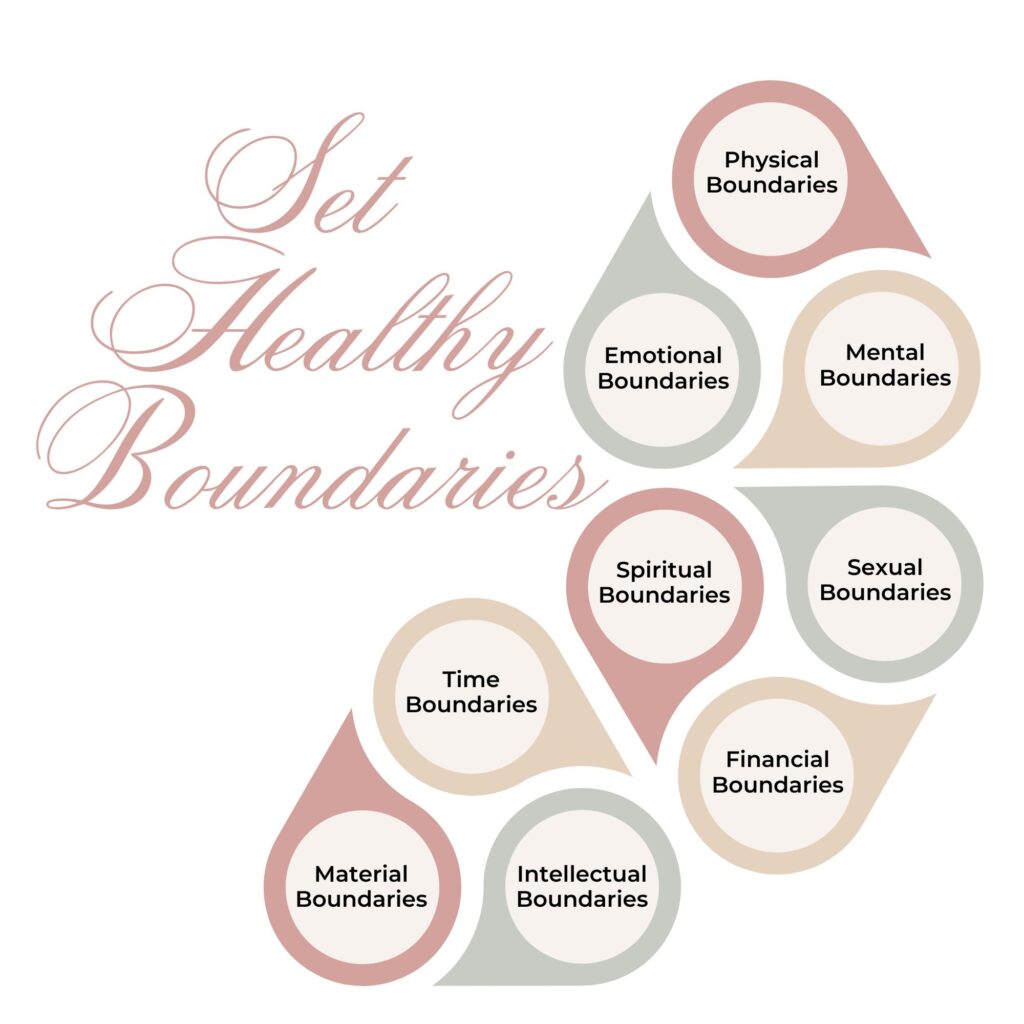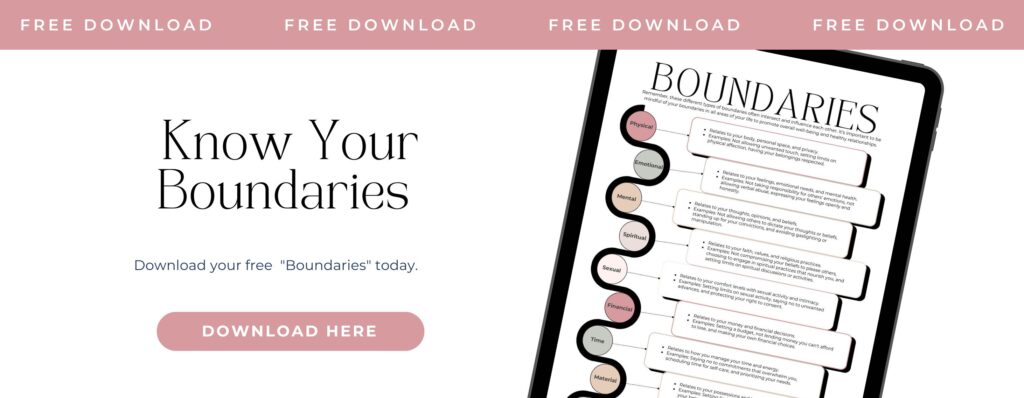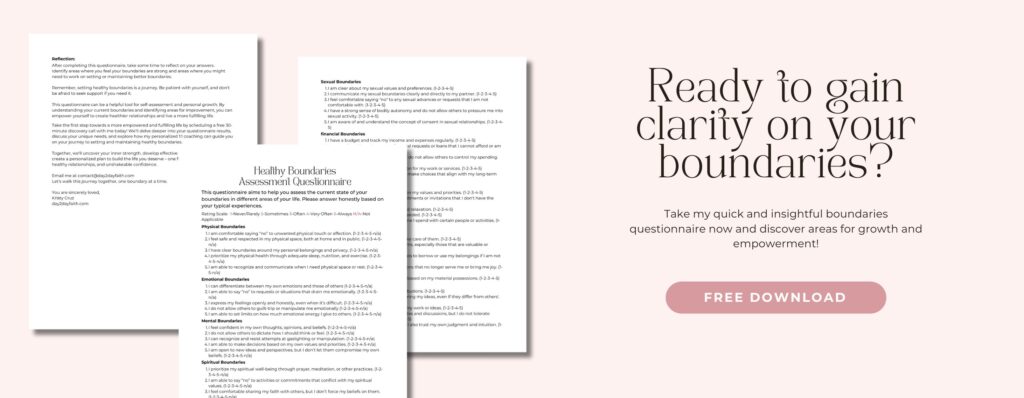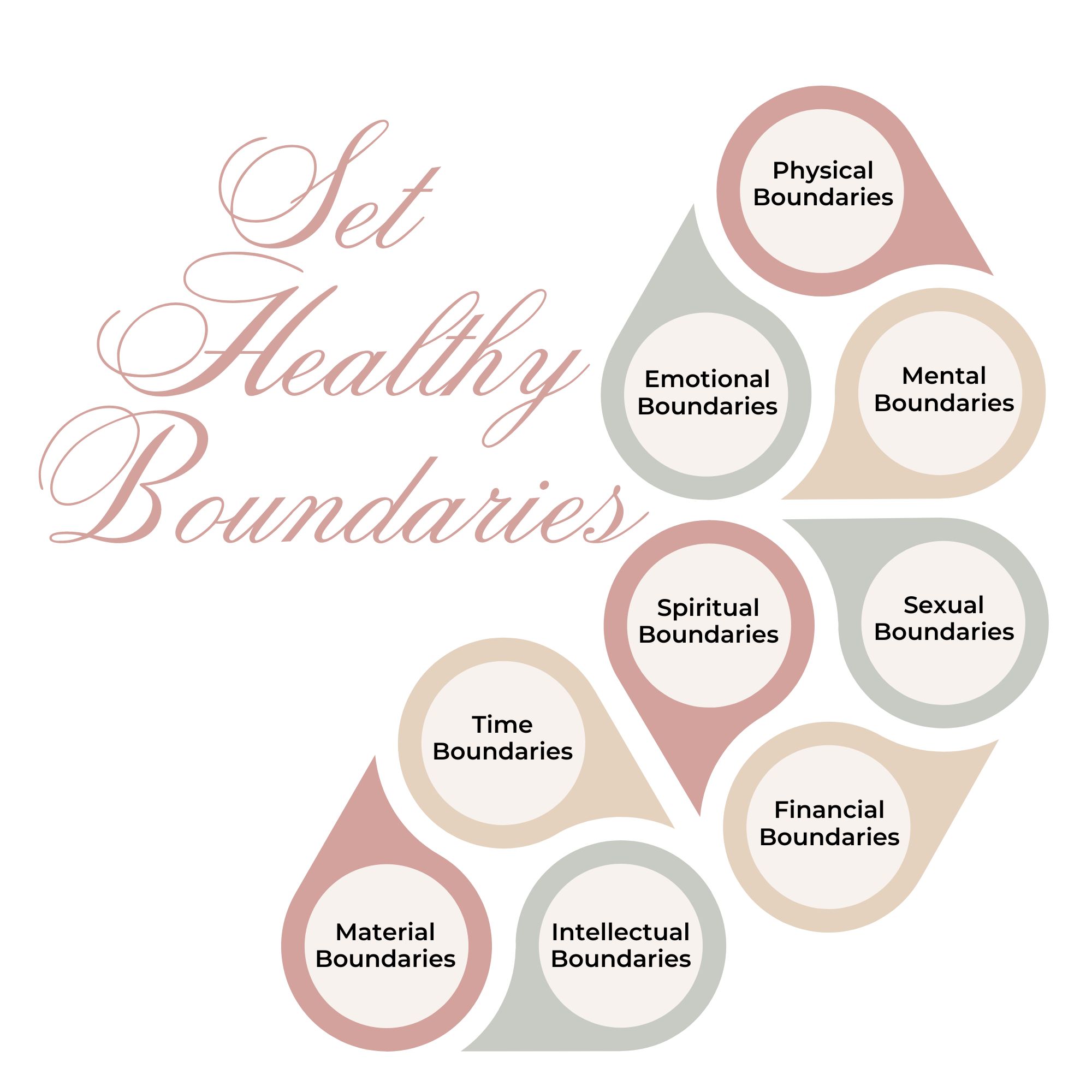© - Content and images in this blog are copyright Day 2 Day Faith unless stated otherwise. Feel free to repost or share images for non-commercial purpose, but please make sure to link back to this website and its original post.
℗ - We do not store any information about your visit to our website other than for analytics and optimization for content and reading experience through the use of cookies.
℅ - Our site does at times contain paid advertisements, sponsored content, and/or affiliate links.
Reader Etiquette
Sign up and receive your free membership to our collection of tips and guides for styling from our professional team
The Resource Library
Join the Resource Library
Browse by Category
Search the blog & press enter
This blog is your safe space. Here, we'll dive into the complexities of domestic violence, its impact , and the empowering journey towards reclaiming the life God has waiting.
Welcome to The blog
Understanding the different types of boundaries
There are different types of boundaries and I have watched so many people around me struggle with setting healthy boundaries. They want a life where they are appreciated and valued but without clear boundaries and being intentional about maintaining those boundaries, they are inviting chaos. I know that may sound harsh. And realizing that the responsibility of our boundaries is on each of us is not an easy pill to swallow.
Let’s put a positive light on setting healthy boundaries. As a mom it was my job to teach my children boundaries that would keep them safe. Don’t cross the street without looking both ways, don’t lay your hand on the stove if mama says it’s hot, and so many more like those while they are little. As they grew older, they had to learn different types of boundaries. Over the last maybe 6 or 7 years I’ve been teaching my daughter about money management. I knew she needed to learn to budget and save and how to invest because I didn’t want to see her struggle to learn it later in life like I had to. And I still don’t always get it right but boy she has done amazing. These are just a few examples of where I had to first set the boundary for them and then it was their job to set their own personal boundaries.

Why Boundaries are Important:
Setting healthy boundaries is connected to so much more than just self-care and mental health. Taking the time to discover your boundaries is so important. Here’s just a few reasons why:
- Setting boundaries shows that you value yourself and your needs.
- Setting boundaries prevents you from being overwhelmed, manipulated, or taken advantage of.
- Setting boundaries helps you create a foundation of mutual respect and understanding in your interactions with others.
- Setting boundaries allows you to focus on your needs and priorities, leading to personal growth and development.
- Setting boundaries makes it where you don’t get over committed and experience burn out.
I know as a mom if I’m not careful in setting personal boundaries with others and especially myself I will get so overwhelmed, and I can’t take care of anyone.
Setting Healthy Boundary Quote
“The more you value yourself, the healthier your boundaries are.” — Lorraine Nilon
What are Boundaries
Our boundaries are defined as to what is acceptable and unacceptable behavior from others and even ourselves. They are to protect us not restrict us. Who and what we allow around us will determine not just our mental and physical health but even the trajectory of your futures. Knowing what your boundaries are and how to maintain them is key.
Setting Personal Boundaries
You cannot sit down and set your boundaries all in one go. But you can get a baseline. I have a quiz I offer each of my clients that want to get better grounded in their boundaries whether in personal relationships or even in the work environment. I want to give you the chance to take this quiz and maybe see where your boundary lines are. This will only give you a baseline.
Taking the time to find your main starting point will give you a huge advantage when you need to set a boundary for a specific person or situation. Your boundaries will change with each person and in each environment and they should. Never let anyone make you feel guilty about having different “standard” for different people. Every person and scenario I encounter needs a different boundary. I have different boundaries for my work than I do my life. I will not over commit myself to a job and have nothing left over for my family when I get home. I have loved ones that I do not allow to have access to me except over the phone or through text they are not welcome in my home. Being non-negotiable on some boundaries that I endured harsh backlash saved my marriage. I know my value and I want you to know yours.
Types of Boundaries
Now let’s dive into some different types of boundaries. I’ll bet some of these haven’t even crossed your mind.
Physical Boundaries:
This relates to your body, personal space, and privacy. I always connected physical boundaries to the physical touch from someone else that I felt comfortable with but it’s so much more.
- Maintaining a comfortable distance from others during conversations or social interactions. Not allowing people to stand too close or crowd you.
- Deciding who can touch you and how. This might include saying no to hugs, kisses, or other physical contact if you’re not comfortable.
- Having your own personal space and belongings respected. Not allowing others to enter your room or go through your things without permission.
- Making your own choices about your body, including what you wear, how you groom yourself, and what medical procedures you undergo.
- Removing yourself from situations or environments that feel unsafe or threatening. Saying no to activities that could put your physical well-being at risk.
Emotional boundaries:
This type of boundary relates to your feelings, emotional needs, and mental health. I got to be honest this is one that I never even thought of.
- Not taking on other’s emotions when you have a friend that is going through a breakup and constantly vents to you, leaving you feeling drained and overwhelmed.
- Saying no to emotional dumping of a coworker who constantly complains about their personal problems, leaving you feeling emotionally burdened and unable to focus on your work.
- Protecting yourself from emotional manipulation when your partner uses guilt trips or silent treatment to get their way or make you feel bad.
- Choosing who you share your feelings with when you feel pressured to share personal details with a new acquaintance who is overly inquisitive about your past.
- Expressing your feelings openly and honestly if you feel hurt by a friend’s comment, but you’re afraid to speak up and express your feelings.

Mental Boundaries:
This type of boundary relates to your thoughts, opinions, and beliefs. This is certainly a struggle area for those of us that have experienced domestic violence.
- Protecting your thoughts and opinions and not allowing others to tell you what to think or how to feel about a particular issue or situation.
- Resisting manipulation and gaslighting and recognizing and challenging attempts by others to distort your reality, make you doubt your own perceptions, or question your sanity.
- Intellectual autonomy is like making your own decisions and choices based on your own values and beliefs, rather than being swayed by others’ opinions and pressures.
- Respecting differences of opinion and engaging in healthy debates and discussions while maintaining respect for differing viewpoints, even if you strongly disagree.
- Setting limits on information sharing and choosing not to engage in conversations or share personal information that you’re not comfortable with or that feels inappropriate.
Spiritual Boundaries:
This type of boundary relates to your faith, values, and religious practices. This is probably one that isn’t thought of but is so important for peace of mind. Here are 5 examples of spiritual boundaries.
- Protecting your personal beliefs and practices and choosing not to participate in activities or events that conflict with your faith beliefs.
- Choosing your spiritual community and deciding which church or religious group you want to be a part of and setting limits on involvement with those that don’t align with your values.
- Saying no to spiritual manipulation and resisting pressure from others to adopt their beliefs or practices, or to engage in spiritual activities that make you uncomfortable.
- Protecting your prayer time and devotionals by setting aside dedicated time for prayer, meditation, or Bible study without interruptions or distractions.
- Sharing your faith on your own terms and deciding when and with whom you feel comfortable discussing your faith and beliefs.
Sexual Boundaries:
This type of boundary relates to your comfort levels with sexual activity and intimacy. These need to be set even in marriage.
- Consent and choice being clearly communicated dealing with your willingness or unwillingness to engage in and sexual activity and respecting your partner’s boundaries as well.
- Types of sexual activity and expressing your preferences and limits regarding specific sexual acts or behaviors and ensuring both partners are comfortable and enthusiastic about any sexual activity.
- Frequency and timing of sexual activity and communicating how often and when you are comfortable with sexual activity and setting boundaries around when and where it takes place.
- Physical affection and setting limits on public displays or affections or types of physical touch you are comfortable with in different settings.
- Sexual communication and establishing open and honest communication about sexual needs, desires, and concerns, and respecting each other’s boundaries within these conversations.
Financial Boundaries:
This type of boundary relates to your money and financial decisions. You really need to know how your view money this such a heart issue and connection.
- Creating a monthly budget that allocates funds for necessities, savings, and discretionary spending, and consciously tracking your expenses to ensure you stay with your budget.
- Politely declining requests for loans from friends or family members who have a history of not repaying debts or setting clear terms and expectations if you do choose to lend money.
- Managing your own finances and making decisions about your spending, savings, and investments without undue influence or pressure from others.
- Advocating for yourself in the workplace by negotiating a fair salary, benefits, or raise based on your skills and experience.
- Declining to co-sign a loan, donate to a cause you don’t support, or participate in expensive activities that are beyond your budget.
Time Boundaries:
This type of boundary relates to how you manage your time and energy. This one can be tough for us moms.
- Not checking work emails or taking work calls outside of designated business hours, ensuring you have time for rest and a personal life.
- Declining invitations or requests for your time when you’re already feeling overwhelmed or stretched thin, prioritizing your existing commitments and self-care.
- Blocking off specific times in your calendar for activities that nourish and recharge you, such as exercise, hobbies, or relaxation.
- Setting boundaries on how much time you spend with individuals who drain your energy or engage in unhealthy behaviors.
- Establishing a consistent sleep schedule and creating a relaxing bedtime routine to ensure you get adequate rest.
Material Boundaries:
This type of boundary relates to your possessions and how you share them. You have every right to choose who and how your possessions are used.
- Setting limits on what you are willing to lend or borrow from others, especially items that are valuable or sentimental.
- Deciding who can use or access your personal belongings, such as your car, computer, or clothing.
- Treating others’ belongings with care and asking for permission before using or borrowing them.
- Setting limits on the value or type of gifts you give or receive.
- Establishing expectations for cleanliness and organization in shared spaces, such as a home or workspace.
Intellectual Boundaries:
This type of boundary relates to your thoughts, ideas, and creative works.
- Not allowing others to take credit for your ideas or plagiarize your work.
- Deciding when and with whom you share your knowledge or expertise.
- Not using or sharing copywrite material without permission, citing sources properly, and giving credit where credit is due.
- Participating in discussions and debates while maintaining respect for differing viewpoints.
- Choosing educational opportunities and learning experiences that align with your interests and goals.

Take Time to Set Personal Boundaries
All this information and seeing all the different boundaries can certainly seem overwhelming. Don’t stress. Take a breath and allow the next situation to come, take a step back and allow yourself to look at whatever situation is in front of you. Decide at that moment what your boundary will be. Remember it’s ok to have different boundaries or standards for different people and different situations.
As you begin to set and maintain your boundaries, I want you to be prepared that some people will not like it. As you are discovering who you are and what environment you want around you will have to decide who will have access to you and what terms that access will have. Let God lead you in your decisions.
Boundaries are God’s way of protection
I had a hard time setting boundaries in the beginning just due to childhood traumas and experiencing domestic violence. I began to learn to stand my ground and put my needs first and boy did that make some people mad. I saw that I couldn’t take care of my family if I allowed myself to be run in the ground. I also saw that I was teaching my daughter that if I put her first above my own health and mental stability, she was either going to be a spoiled brat no one wanted around (including myself) or she was going to one day allow herself to be put down and walked allover. I needed to show her and others that taking care of you doesn’t in any way make you selfish.
Call to Action:
Take the first step towards a more empowered and fulfilling life by scheduling a free 30-minute discovery call with me today! We’ll delve deeper into your questionnaire results, discuss your unique needs, and explore how my personalized 1:1 coaching can guide you on your journey to setting and maintaining healthy boundaries.
Together, we’ll uncover your inner strength, develop effective communication skills, and create a personalized plan to build the life you deserve – one filled with self-respect, healthy relationships, and unshakeable confidence.
Let’s walk this journey together, one boundary at a time.
Leave a Reply Cancel reply
Get your FREE eBook here.
- Practical tools and biblical wisdom for processing your emotions and reclaiming your identity.
- Strategies for setting healthy boundaries, practicing self-care, and cultivating forgiveness.
- Encouragement and guidance to embrace the abundant life God has planned for you.
Are you a ready to heal and find joy after a toxic relationship?
free ebook
Benefits of Christian Life Coaching
coming soon
Cultivating Confidence even when you're afraid
Read now
What is a Christian Life Coach
Read Now
beyond trauma
setting boundaries
stress management
identity & passion
Browse Categories
read all posts
ON the BLOG
merch - COMING SOON
mini courses - COMING SOON
journals - coming soon
Freebies - coming soon
Christian life coaching Resources for Healing from Domestic Violence
the day 2 day shop
benefits of Christian life coaching - coming soon
Ep. 03
How to choose the best Christian life coach for you - coming soon
Ep. 02
What is a Christian Life Coach - coming soon
Ep. 01
Your supportive companion on the journey of rebuilding your life after domestic violence. You are not alone. Here, you'll find strength, hope, and practical guidance to navigate every step of your healing process. Here you'll find empowering stories, expert advice, actionable steps, and a supportive community.
The Day 2 Day Podcast - COMING SOON
THE day 2 day podcast — with kristyn
Confidence boost

leave a comment!
Comments